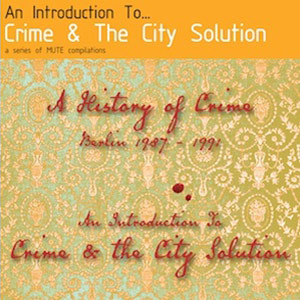
An Introduction to... Crime & The City Solution
A History of Crime: Berlin 1987–1991
Mute
While Simon Bonney first formed Crime & The City Solution in Sydney in 1977, it wasn’t until the band moved to England in the ’80s that it really got going. With former Birthday Party members Mick Harvey and Roland Howard, as well as Roland’s brother Harry and the Swell Maps’ Epic Soundtracks, reconstituting the band, they released a couple EPs and a full-length, Room of Lights, which unsurprisingly favored a sooty, blues-tinged version of post-punk, not so unlike Harvey and Howard’s previous work, though admittedly not as riveting.
That group disintegrated once Bomney decided to relocate again, this time to Berlin. With only Harvey and his wife Bronwyn Adams, who had entered the fold for the recording of Room of Lights, joining him, he drafted a new line-up that included Einsturzende Neubauten’s Alexander Hacke and ex-DAF member Chrislo Haas. This line-up made three albums—Shine (1988), The Bride Ship (1989) and Paradise Discotheque (1990)—before calling it a day after recording a song for Wim Wenders’ Until the End of the World.
While the early incarnation of Crime & The City Solution may be more notorious, it is the Berlin-based version that created the bulk of the band’s catalog and which is the focus of this introductory compilation. It’s probably also arguable that it was with this line-up that Bomney created his most individualistic work, distinguishing Crime from being just another footnote in the Birthday Party family tree.
Each of the band’s three records from this period are represented in equal measure. The first four tracks are derived from Shine and show the band not drifting too far from their previous incarnation’s output. “All Must Be Love” comes off like a rewriting of “The End” and is just as grotesquely melodramatic, making for a difficult entry point. “Hunter” is the best of the bunch, if only for its vitriolic stomp, though the strum and Sturm und Drang of “On Every Train (Grain Will Bear Grain)” has its bright spots.
Bomney’s voice emerged with The Bride Ship. Complimented by a bombastic approach from his cohorts led by Adams’ violin, the escalated sonics of tracks like “Free World” suits him. This approach carried over to Paradise Discotheque and works exceptionally well on “The Dolphins and the Sharks.” However, with “Last Dictator,” a four-part song-suite concerning Romanian warlord Nicolae Ceaucescu, the band probably overshot both its capabilities and its audience’s patience. Be that as it may, Crime & The City Solution’s ambition was probably its greatest asset, and that is in great evidence here.
Stephen Slaybaugh
MP3: “The Adversary”
PAST PERFECTS
Spain, The Blue Moods of Spain, She Haunts My Dreams and I Believe
Archers of Loaf, All the Nations Airports and White Trash Heroes
Blur, Blur 21: The Box
Can, The Lost Tapes
Sugar
The English Beat, The Complete Beat
The Guns
Lost Sounds, Lost Lost: Demos, Sounds, Alternate Takes & Unused Songs 1999-2004
This Ain't Chicago
Factrix
Silver Jews, Early Times
Codeine, When I See the Sun
Paul Simon, Graceland
Germs, (GI)
